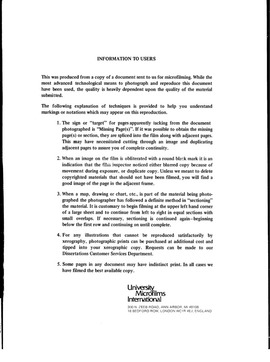| dc.contributor.author | Cragin, John Paul, | en_US |
| dc.date.accessioned | 2013-08-16T12:28:07Z | |
| dc.date.available | 2013-08-16T12:28:07Z | |
| dc.date.issued | 1980 | en_US |
| dc.identifier.uri | https://hdl.handle.net/11244/4761 | |
| dc.description.abstract | An empirical test of the model indicates that importance perceptions may be in large part interpretable in terms of cognitive structure. Results also indicate the use of multiple outcomes in the evaluation and interpretation of importance perceptions may be more useful than the use of single outcomes. Furthermore, it appears that very large proportions of the variance in importance ratings may be accounted for in certain subgroups of subjects--particularly males, the highly educated and older individuals. There is also some evidence to suggest that the greater the experience or knowledge an individual has concerning a particular factor, the more likely his perceptions of the importance of that factor will be explained in terms of the cognitive model. | en_US |
| dc.description.abstract | This study was concerned with determining the nature of importance perceptions. A review of the literature indicates that for over thirty years theorists and researchers have employed the importance construct to amplify and support theories and empirical findings having to do with individual and organizational performance, motivation and attitudes. Yet, for all its usage, the nature of importance perceptions as applied to work and non-work factors, remains virtually undeveloped conceptually and empirically. This study reviews and organizes the major connotative definitions of importance and formulates a conceptual approach to importance based upon theories of cognitive structure. A model is developed which conceives of importance in terms of (1) the dependence of identifiable multiple outcomes on the factor in question, (2) the criticalness of the dependent relationship between factor and outcomes, (3) the cognitive centrality of the factor, and (4) the temporary cognitive prominence of the factor due to the occurrence of events outside the normal experiences of the individual. | en_US |
| dc.format.extent | ix, 231 leaves : | en_US |
| dc.subject | Business Administration, General. | en_US |
| dc.title | An investigation of the nature of importance perceptions. | en_US |
| dc.type | Thesis | en_US |
| dc.thesis.degree | Ph.D. | en_US |
| dc.thesis.degreeDiscipline | Michael F. Price College of Business | en_US |
| dc.note | Source: Dissertation Abstracts International, Volume: 41-06, Section: A, page: 2679. | en_US |
| ou.identifier | (UMI)AAI8027509 | en_US |
| ou.group | Michael F. Price College of Business | |
